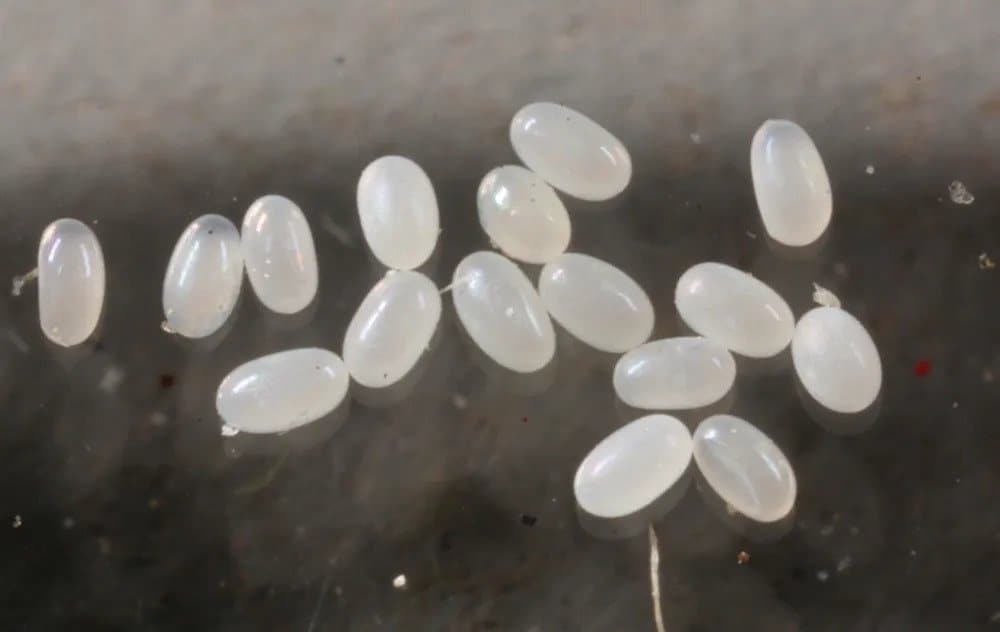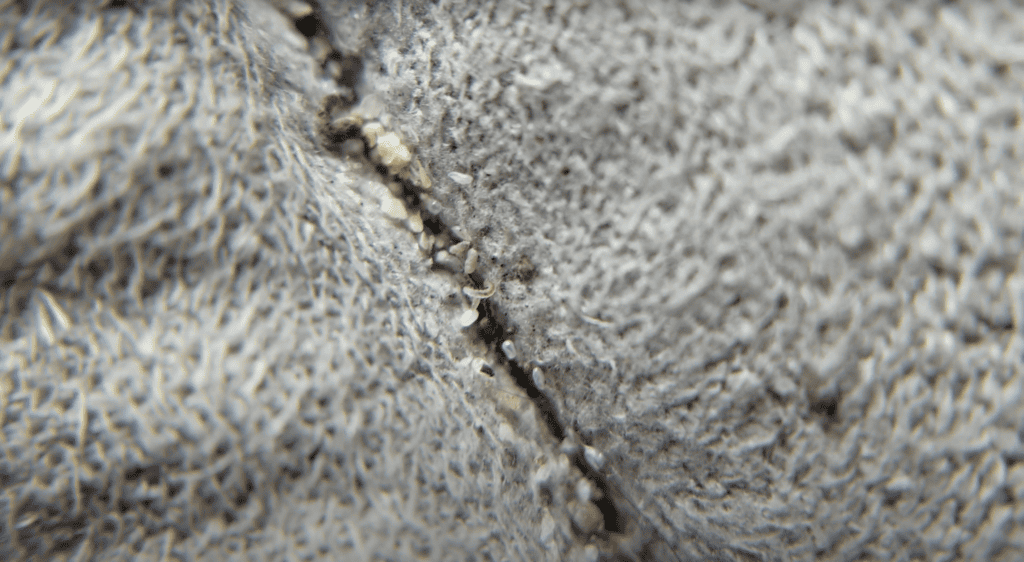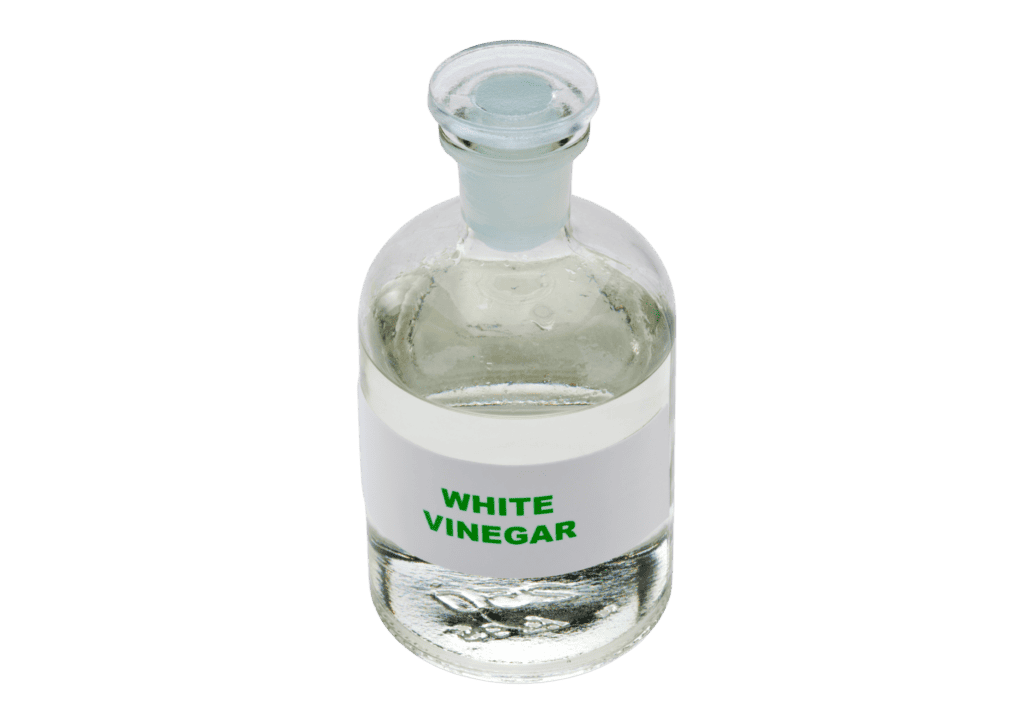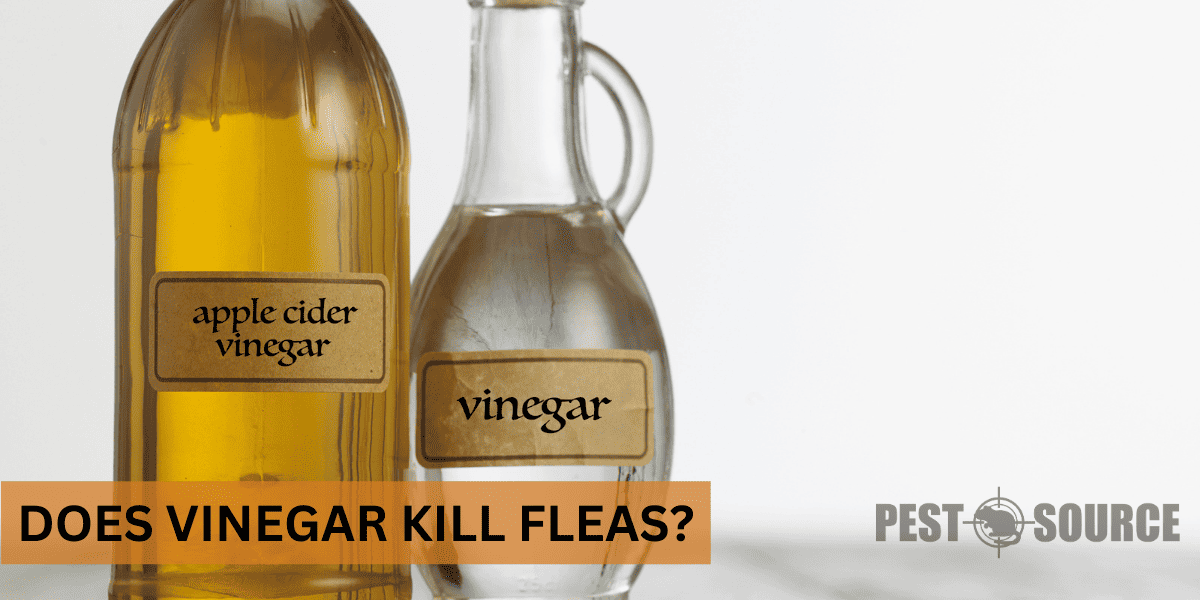Flea infestations can be a nuisance and a health hazard for both humans and pets. Homeowners are often on the lookout for natural solutions to tackle these pesky parasites. One such remedy is vinegar, which has been utilized as a versatile household solution for various cleaning and pest control purposes.
In this article, we’ll explore whether vinegar, specifically apple cider vinegar and white vinegar, can effectively kill fleas or merely repel them. We’ll also discuss the efficacy of vinegar in controlling fleas on dogs and cats and the application methods for using vinegar in flea control. Our focus is to provide you with a reliable and practical guide to understand how vinegar can be safely and effectively incorporated into your pest management strategy.
POINTS
- Vinegar, including apple cider vinegar and white vinegar, serves as a flea repellent due to its strong odor and acidic nature but is not a guaranteed method for killing fleas directly.
- While vinegar can help in repelling fleas on pets such as dogs and cats, relying solely on vinegar is not recommended for complete flea control. Instead, a combination of grooming, cleansing, and veterinarian-approved treatments should be implemented.
- Flea control in carpets and the environment requires more than just vinegar. Regular vacuuming, use of flea-specific treatments, and professional pest control services are necessary for effective flea eradication.
- Always consult with a veterinarian before using vinegar on your pets, as some pets, particularly cats, may be sensitive to vinegar and may experience discomfort or skin irritation.
- Vinegar should be viewed as a supplementary measure in an integrated flea control strategy that involves both pet care and environmental maintenance for successful prevention and elimination of flea infestations.
Understanding the Flea-Vinegar Relationship: A General Overview
Does vinegar kill fleas?

Vinegar has been hailed as a versatile and cost-effective home remedy for controlling a variety of pests, including fleas. However, the truth is that vinegar alone may not fully kill fleas, but it can serve as an effective natural remedy for repelling and preventing flea infestations.
What does vinegar do to fleas?
Vinegar contains acetic acid which is known to cause discomfort to fleas. Fleas are naturally repelled by the strong odor and acidic nature of vinegar. Although vinegar cannot necessarily kill fleas in their entirety, it can help in addressing the flea problem in your home as a part of an overall control strategy.
Does vinegar repel fleas?
Yes, vinegar has been observed to repel fleas due to its strong smell and acidic nature. Utilizing a diluted vinegar solution on your pets and throughout your home can create an environment that is less hospitable to fleas and may encourage them to find an alternative habitat.
Can vinegar kill fleas?
When applied directly to the fleas, vinegar may suffocate them or cause them to have an unfavorable reaction, ultimately killing them. However, vinegar’s ability to kill fleas is limited, and it should not be relied upon as a primary method of flea control. Instead, it should be considered as part of a more comprehensive flea control strategy.
Do fleas hate vinegar?
Fleas are naturally repelled by the strong, acidic odor of vinegar. While fleas may not necessarily “hate” vinegar, they do find the smell and acidity of vinegar to be unpleasant, which makes it an effective repellent when used alongside other flea control methods.
How does vinegar kill fleas?
Vinegar can cause dehydration and even suffocation when it comes into direct contact with fleas. However, this is not guaranteed and depends on various factors, such as the concentration of the vinegar solution and duration of exposure. Again, it is important to emphasize that vinegar should not be solely relied upon for flea extermination but instead, should be used alongside other proven flea control methods.
The Efficacy of Vinegar on Different Flea Life Stages
Does vinegar kill flea eggs?
Vinegar is not effective in killing flea eggs. Flea eggs are resistant to most home remedies, and to eliminate them, you will need to rely on proven flea control strategies such as vacuuming regularly, using flea-specific sprays, or the assistance of professional pest controllers.

Does vinegar kill fleas in carpet?
Vinegar’s effectiveness in killing fleas within carpet is limited. While it may create a less hospitable environment for adult fleas due to its strong odor and acidity, it won’t necessarily kill the fleas or eradicate flea eggs and larvae. As for flea control in carpets, regular vacuuming and utilizing flea-specific treatments or hiring professional pest control services is highly recommended.

Does mopping with vinegar kill fleas?

Mopping your floor with a diluted vinegar solution can contribute to making the environment less suitable for fleas due to the acetic acid and strong odor. However, this method may not be effective in directly killing fleas or eradicating flea eggs and larvae. Consistent cleaning routines and incorporation of other pest control strategies provide better results for eliminating fleas.
Does vinegar and salt kill fleas?

A combination of vinegar and salt is sometimes used as a natural remedy for flea control. Salt is said to act as a desiccant, causing dehydration in the fleas and potentially killing them. Although the combination may show some efficacy in repelling fleas, it should not be considered a complete solution for flea control and is best used alongside other effective methods.
Does vinegar and water kill fleas?
A diluted vinegar and water solution can create an environment less hospitable to fleas and act as a repellent. However, it may not provide complete elimination of fleas, especially in the case of more severe infestations. Utilizing proven flea control strategies, such as specific insecticides and professional services, will yield better results in solving flea issues.
Varieties of Vinegar: Comparing Apple Cider Vinegar and White Vinegar in Flea Control
In the quest for natural flea control methods, pet owners often turn to household staples like vinegar. Below is a comparative analysis of apple cider vinegar and white vinegar, focusing on their use in flea control, to help you understand their differences and how they can be applied in this context.
| Aspect | Apple Cider Vinegar | White Vinegar |
|---|---|---|
| Source | Made from fermented apple juice. | Made from fermented grain alcohol. |
| Acidity | Typically around 5-6% acetic acid, which gives it a potent but slightly less harsh acidity compared to white vinegar. | Usually contains 5-7% acetic acid, making it slightly stronger in terms of acidity. |
| Odor | Has a distinct fruity smell that can be more pleasant for some people and pets. | Possesses a sharp, pungent smell that might be more off-putting to pets and people alike. |
| Effectiveness in Repelling Fleas | Effective in repelling fleas due to its strong odor and acidity. However, not a foolproof solution for killing fleas. | Similarly effective in repelling fleas with its strong odor and higher acidity but shares the same limitations in killing fleas. |
| Safety for Pets | Generally safe for use on pets in diluted form, but always consult with a vet first. Can cause irritation for some pets. | Similar to apple cider vinegar in terms of safety, but its stronger odor and acidity could increase the risk of irritation. |
| Application Methods | Can be diluted and applied to a pet’s coat or used in home cleaning solutions to repel fleas. | Often used in the same manner as apple cider vinegar for repelling fleas, with dilution recommended for pet applications. |
| Cost | Slightly more expensive than white vinegar, due to the process of making it from apples. | Generally cheaper and more readily available than apple cider vinegar, making it a cost-effective option for flea control. |
| Additional Benefits | Besides flea control, it’s touted for various health benefits in pets, such as improving skin and coat health. | Beyond pest control, white vinegar is a strong cleaning agent, useful for disinfecting areas where fleas may live. |
Does apple cider vinegar kill fleas?

While apple cider vinegar does not kill fleas outright, it can help repel them with its pungent smell and acidic nature. It’s crucial to remember that using apple cider vinegar alone is not enough to entirely eliminate fleas from your environment or pets but can be a supportive measure within a comprehensive flea control plan.
Will apple cider vinegar kill fleas?
Apple cider vinegar can provide some relief in repelling fleas, making your home and pets less appealing for these pests. However, it is not a guaranteed method for killing fleas directly, and relying solely on apple cider vinegar for flea control is not recommended.
Can apple cider vinegar kill fleas?
In some instances, direct application of apple cider vinegar on fleas may suffocate or harm them, but its effectiveness as an ultimate flea killer is limited. Hence, it is suggested to combine apple cider vinegar as one element of a more thorough flea control strategy.
Does apple cider vinegar get rid of fleas?
While apple cider vinegar can play a role in repelling fleas and making your environment less suitable for them, it is not a complete solution or a standalone method for getting rid of fleas. Employing other methods, such as insecticides and professional pest control, is essential for a successful flea elimination plan.
Does white vinegar kill fleas?

Like apple cider vinegar, white vinegar can repel fleas and create an unwelcome environment due to its acidic nature and potent smell. White vinegar, however, does not effectively kill fleas on its own and should be used in conjunction with other flea control methods to ensure a successful solution to the pest problem.
The Role of Vinegar in Flea Control for Dogs
Does vinegar kill dog fleas?
Vinegar, white or apple cider, can contribute to repelling fleas on dogs, but it is not a surefire way to kill fleas completely. An integrated approach to flea control for your dog should include regular grooming, veterinarian-approved flea treatments, and maintaining a clean environment to prevent re-infestation.
Apple cider vinegar for dog fleas: How effective is it?
Apple cider vinegar can serve as an effective flea repellent for dogs due to its strong smell and acidic properties. However, it should not be solely relied upon for treating fleas in dogs. A combination of regular grooming, medications, and environmental control is more effective in addressing a flea problem.
Will vinegar kill fleas on a dog?
Vinegar can help repel fleas on a dog but is not a 100% effective method for killing them. It is crucial to implement a thorough flea control plan that includes adequate grooming, flea-specific medications, and maintaining a clean environment.
Vinegar on dogs for fleas: Is it safe?
Though vinegar is generally safe for dogs when used in a diluted form, it is best to consult with your veterinarian before applying vinegar to your dog’s skin, as some dogs might have sensitivities to vinegar. Additionally, ensure the solution is appropriately diluted to avoid skin irritation or discomfort.
How to get rid of fleas on dogs with apple cider vinegar?

To help repel fleas with apple cider vinegar, follow these steps:
- Dilute apple cider vinegar with water, using a 1:1 ratio.
- Apply the solution to your dog’s fur using a spray bottle or a sponge, being careful to avoid the eyes, nose, and mouth.
- Allow the solution to air dry on your dog’s coat.
- Regularly inspect and groom your dog to keep track of flea issues.
- Consult with your veterinarian for guidance on using vinegar in conjunction with other flea control treatments.
Remember that using apple cider vinegar is not a complete solution for getting rid of fleas on dogs and should be combined with other approaches to tackle the problem effectively.
The Role of Vinegar in Flea Control for Cats
Does vinegar kill fleas on cats?

Vinegar, both apple cider and white, can provide some relief in repelling fleas on cats but does not effectively eliminate fleas entirely. It’s essential to remember that using vinegar alone is not enough to entirely eradicate fleas from your cat – a comprehensive flea control plan is required.
Apple cider vinegar for cat fleas: How effective is it?
As a natural remedy for flea control in cats, apple cider vinegar can offer some repelling benefits due to its strong smell and acidity, making it less appealing for fleas. However, it’s essential to rely on other methods of flea control, including specific medications and regular grooming, for successful flea management.
Is vinegar safe for use on cats for fleas?
Cats can be more sensitive to certain substances than dogs, including vinegar. If you wish to try using vinegar for fleas on your cat, consult with your veterinarian first to ensure it’s a safe choice. If given the green light, use a diluted vinegar solution to minimize the risk of skin irritation or discomfort.
How does apple cider vinegar work for fleas on cats?
Apple cider vinegar can work as a repellent for fleas on cats due to its strong odor and acidity. While it may provide some relief, it should not be considered a standalone solution for addressing a flea problem.
Exploring Specific Apple Cider Vinegar Applications and Recipes for Flea Control
How to get rid of fleas naturally with vinegar?

To use vinegar as a natural flea repellent, follow these steps:
- Dilute apple cider vinegar or white vinegar with water (1:1 ratio).
- Apply the solution to your pet’s fur using a spray bottle or sponge, avoiding the eyes, nose, and mouth.
- Use the same diluted solution to mop floors, clean surfaces, and wipe furniture to create a less hospitable environment for fleas.
- Be consistent with your cleaning routines and pet grooming.
- Work closely with your veterinarian and incorporate other flea control measures to ensure a comprehensive solution.

Apple cider vinegar spray for fleas: How to make and use it?
To create an apple cider vinegar spray for fleas, follow these steps:
- Mix equal parts apple cider vinegar and water in a spray bottle.
- Lightly mist the solution onto your pet’s fur, avoiding sensitive areas like eyes, nose, and ears.
- Use the same mixture to spray on household surfaces and fabrics where fleas may reside.
Apple cider vinegar flea trap: How does it work?

An apple cider vinegar flea trap works by attracting fleas to the scent of the vinegar and then trapping them in the liquid. Follow these steps to create an apple cider vinegar flea trap:
- Fill a shallow dish with equal parts water and apple cider vinegar.
- Add a drop of dish soap to break the water’s surface tension, preventing fleas from escaping.
- Place the dish in flea-infested areas and let it sit overnight.
- Check the trap in the morning, dispose of the trapped fleas, and replace the solution.
Apple cider vinegar and dawn for fleas: Is it an effective combination?

Combining apple cider vinegar and Dawn dish soap may enhance the solution’s ability to trap and kill fleas. The vinegar works as a repellent, while the dish soap works to break the water’s surface tension, making it harder for fleas to escape once trapped.
Apple cider vinegar in dog water for fleas: Is it a safe and effective method?

Giving your dog small amounts of apple cider vinegar in their water is believed to help deter fleas from the inside out. However, it is crucial to consult with your veterinarian before attempting this approach, as every dog differs in sensitivities and tolerance to vinegar.
Understanding the Effectiveness and Limitations of Vinegar for Flea Control
Vinegar, particularly apple cider vinegar, can serve as a helpful aid in repelling fleas but is not a standalone or foolproof solution for flea control. Flea prevention and treatment should involve a combination of cleaning routines, grooming procedures, and veterinarian-approved treatments for both your pets and their environment.
Concluding Thoughts: Vinegar and Flea Control
Vinegar can serve as a helpful ally in deterring fleas, but it is not a comprehensive solution for flea control. Ensuring that you have an integrated pest management strategy that includes vinegar along with other effective methods such as grooming, cleaning, and medically approved treatments will help you prevent, control, and eliminate fleas more effectively. Always consult with your veterinarian for the best approach and ensure the safe utilization of vinegar for flea control.



